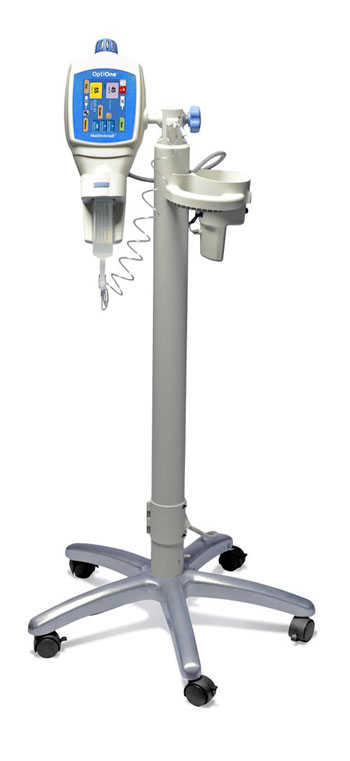Entry-Level Contrast Injector Offers Multipurpose Functionality
By MedImaging International staff writers
Posted on 01 Mar 2016
A new delivery system injects radiopaque contrast agents into the vascular system during diagnostic computerized tomography (CT) scan examinations.Posted on 01 Mar 2016
The OptiOne Single-Head Contrast Delivery System is designed to adapt to the workflow of the imaging department by providing a fully programmable powerhead with intuitive bedside operation and flexibility of use that can accommodate both prefilled and empty syringes. The system consists of the powerhead, a control console that provides programmability of the injection process through a touch screen display system, and a power supply. The powerhead contains the components to perform the actual injection, including the motor, motor control circuits, ball screw, and syringe push ram.

Image: The OptiOne Single-Head Contrast Delivery System (Image: courtesy of Guerbet).
Each injection is delivered with a microprocessor-controlled, motor-driven syringe mechanism with operator control of flow rate, volume, pressure, and timing. Available in both ceiling-suspended and pedestal forms, the OptiOne is intended for use by radiology technologists and other licensed medical practitioners in a healthcare facility. The OptiOne Single-Head Contrast Delivery System is a product of Guerbet (Villepinte, France), and has been approved by the US Food and Drug Administration (FDA).
“We are extremely pleased to announce the availability of this newest injector system, as we believe that it offers additional flexibility to our customers, while providing the innovative features technologists have come to expect from Guerbet,” said Massimo Carrara, US General Manager for Guerbet. “The US approval for OptiOne builds upon Guerbet's commitment to be a global leader specializing in contrast media and imaging solutions and services.”
Contrast agents help to improve the visibility of specific organs, blood vessels, or tissues. There are several types, with Iodine-based and barium-sulfate compounds used in X-ray and CT imaging exams. Injectable agents most often include iodine, which temporarily change tissue appearance. Patients with impaired renal function should be given special consideration before receiving iodine-based contrast materials by vein or artery, as they are at risk for developing contrast-induced nephropathy.
Related Links:
Guerbet














